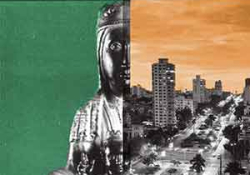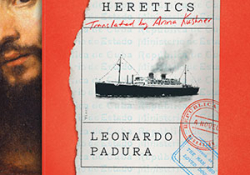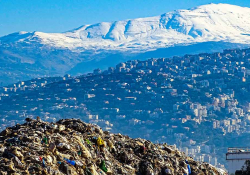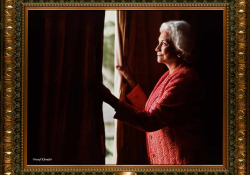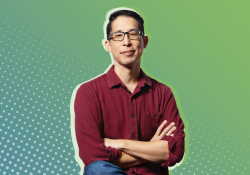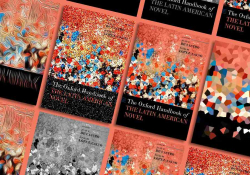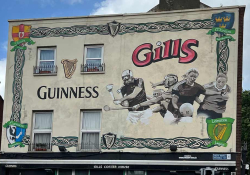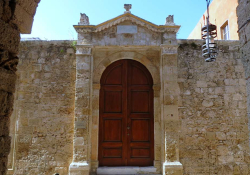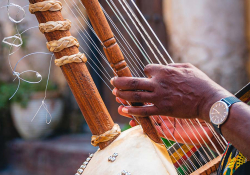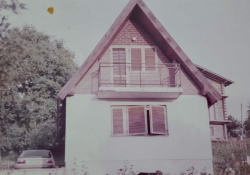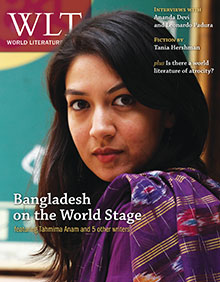Writing in Cuba in the Twenty-first Century
This essay is adapted from Leonardo Padura’s November 2012 speech in Havana, Cuba, at the Casa de las Américas. Padura was the first Cuban writer to whom the Casa de las Américas dedicated its Semana de Autor (author’s week). His comments explore what it means to be a Cuban writer and the social function of writing in Cuba.
There are three questions that I ask myself with regular frequency. Although for some people these questions may not make much sense, trying to find a convincing answer to each of them is one of the challenges that most obsesses me. And I tend to be rather obsessive.
The first question, and perhaps the one that provides the easiest and apparently obvious answer, is Why am I Cuban? The possible facility with which this question could be answered is that I am Cuban simply because I was born in Cuba and have lived all my life in Cuba, so—emotionally, culturally, and humanly—I have no other choice than to be Cuban. This lifelong identity can be further complicated by a certain feeling of cosmic predestination, fate, or geographic grace (the cursed circumstance of Virgil or the Pearl of the Antilles from the times of Spain), reasons completely beyond my control or ability to choose. But the answer might become even more complicated if we assume our belonging to surpass a legal definition; such a belonging would then fall in a territory where personal will does in fact have an influence. That said, if, as happens on many occasions, one places this simple question in a specific context by inserting an oft-used and very useful interjection, very common to the Cuban’s vocabulary, the question can lose all its apparent simplicity and become a philosophical and historical challenge. Is this not what happens when, instead of asking, “¿Por qué soy cubano?” (Why am I Cuban?), one asks, “¿Por qué coño soy cubano?” (Why in the fuck am I Cuban?).
Once asked and nuanced, the question’s relevance to my obsessions becomes more evident because without the question and its possible answers, which may be determined by immediate factors, it would be difficult to begin to ask myself the other two recurring and more complicated questions: Why am I a Cuban writer? And, above all, the question that imitates and at the same time amplifies and modifies with a subordinator the meaning of the previous questions: Why am I a Cuban writer who writes and lives in Cuba?
My lack of knowledge or incorrect knowledge of that dark history did not stop me from noting, however, something that seemed alarming to me: Had the sins or indiscretions of those Cuban writers truly been so severe if, in the beginning of the 1980s, the Republic of Letters was being silently rehabilitated, as if the past had never happened?
If I confess that I don’t have a convincing answer for the first of these last two questions—Why am I a Cuban writer?—you might not believe me. I don’t have an answer, especially because I and many others don’t usually believe in the cosmic predestination that I mentioned before. I should say that I was born and raised in a house where there were only nine books—eight volumes of Reader’s Digest and a Bible. I am the son of the most ordinary parents, a Masonic father and a very Cuban Catholic mother, and until 1980, the highest educational level attained by anyone in my family was the eighth grade. I was raised in a neighborhood called Mantilla, where they still say, “Go to La Habana” when someone moves to the city’s center. Only my mother and a paternal aunt reached this level, but with great difficulty. During the first eighteen years of my life, I dedicated the majority of my time to practicing, watching, or thinking about baseball. Considering this obsession, my family background, and my early love of math, there was no indication of a writing vocation for me at the age when the deepest vocations are often formed.
It was only later, in the philosophy department at the School of Arts and Letters at the University of Havana, that I stumbled upon the desire to be a writer. What is interesting is that I arrived at that place and that encounter by pure socialist coincidence, as my intention as a pre-university graduate was to study journalism, with the dream of becoming a sports columnist. But during that academic year, the journalism major wasn’t offered, nor was art history, which I later attempted to enroll in. In the face of so much reorganization—it was 1975, the cusp of the institutionalization of the country1—and by stumbling after my dream of becoming a baseball writer, I ended up studying Hispanic-American literature without ever imagining that those university “modernizations” would put me on the path of what has become my professional and romantic life. While pursuing Hispanic-American literature for the first time, I felt the possibility of dreaming, no longer about sports writing, but about the practice of literature, and I met the girl who has accompanied me in every act of my existence since then (even though I must admit that sometimes she does so reluctantly). Because of this, unlike other aspiring writers who began to find their footing on the island during those final years of the 1970s and became more visible in the following decade, when I began to feel the demands of literature, I didn’t have the slightest awareness of what universe I was hoping to enter and, in fact, was already entering.
Exactly during those years, one of the most thankless professions one could aspire to in Cuba was precisely the practice of literature, but so many inhabitants of the island enthusiastically devoted themselves to that practice. One might have the impression that we were a writer’s paradise, especially because in the Cuba of 1980, in addition to just poets, narrators, and essayists, there were lots of “collective” creators of new theater, legions of writers of detective fiction, testimony, and science fiction, and thousands of workshop leaders, volunteer and amateur writers: all of them with their contests, prizes, and publications. Curiously, that overpopulation of our Republic of Letters took shape just when dozens of the most distinguished Cuban writers had lived an entire decade of marginalization and silence because of charges, suspicions, and even simple innuendo of different origins. In the middle of this decade some met their death and eternal silence. My lack of knowledge or incorrect knowledge of that dark history did not stop me from noting, however, something that seemed alarming to me: Had the sins or indiscretions of those Cuban writers truly been so severe if, in the beginning of the 1980s, the Republic of Letters was being silently rehabilitated, as if the past had never happened?
And a Cuban writer had to also be a social being with sufficient class consciousness, both of the historic moment and of the intellectual’s responsibility in society, which was to write what one was supposed to write. In short: a compañero was someone capable of handling with skill the castrating art of self-censorship to avoid the insult of being censored.
It was in the most favorable environment of those years that I became—or began to become—a Cuban writer who lived in Cuba, and by way of some atmospheric force rather than rational process, I began to discover how someone who wanted to be what I was in the process of becoming should confront literature: a Cuban writer living in Cuba. To start, someone in my situation was a compañero2 who necessarily should have a job (as a journalist, literary advisor, professor, civil servant) and also be able to realize his literary pursuits, which were carried out during hours stolen from rest or the work day; he was someone whose maximum aspiration lay in the act of waiting in line to publish his works in one of the island presses. Publishing abroad was somewhat vague, distant, accessible only to already historic figures like Alejo Carpentier and Nicolás Guillén, or for authors as renowned as Manuel Cofiño, the writer par excellence, in whose briefcase there were always worn contracts for translations into Russian, Moldavian, Rumanian, and Uzbek of his successful and much-promoted and reprinted novels. And a Cuban writer had to also be a social being with sufficient class consciousness, both of the historic moment and of the intellectual’s responsibility in society, which was to write what one was supposed to write. In short: a compañero was someone capable of handling with skill the castrating art of self-censorship to avoid the insult of being censored.
For a would-be Cuban writer, my work destinations during the decade of the 1980s were the best that I could imagine or choose even today. To my good fortune, the first place I worked was El Caimán Barbudo when El Caimán had become the most active center for the small (or not so small) concerns of young writers at the time.3 So, at El Caimán, I became acquainted with the world and with the figures of Cuban literature of the time, and I developed a strong sense of generational belonging. There, too, I learned the rules of the game established in the 1970s for the world of culture, which continued to function in a kind of endless extra-inning, where any kind of wrong move could be considered a “balk” by the referees of ideological purity. Then, after my rather noisy departure from that cultural magazine (they called a “balk” on me), I went to work for the evening newspaper Juventud Rebelde.4 Supposedly, at the newspaper I was to be ideologically reeducated, but the many hours I was able to dedicate to the reading and practice of journalism broadened my awareness of what my literature could be and educated me, literarily, with the most intimate knowledge of my country’s history. But above all, during those years I was able to undertake on a more mature level an exploration of my expectations of myself and of the society in which I lived. In a painful but quick and efficient way, the year I spent in Angola acquainted me not only with fear (something very personal) but also with true material poverty, misery, and the kindness of human beings, manifest in their clearest and most strengthened states.
At that time, I wrote very little—especially while I was at Juventud Rebelde, where I was consumed, affectionately and dangerously, by newspaper work, but I began to outline some literary interests that dealt with the interests of myself and the other writers of my generation, and also with a logical reaction to what and how literature had been written in Cuba in previous years, especially during the terrible decenio negro (black decade).5 An emerging consciousness that politics and literature should have independent existences, that man and his dramas can or should be the center of artistic creation, and that looking critically at one’s surroundings was a possible responsibility for a writer began to shape collective interests, becoming obvious in the works that we created and even published in those years.
But (due to fortuitous cosmic conjunction or a simple historical-concrete necessity) the 1990s would be my decade of real and definitive transformation into a writer who was Cuban, of course, and who would live in Cuba, ending in the culmination of my becoming a professional writer in 1995. In addition, that period would coincide incidentally with the fall of the Berlin Wall, the teetering and collapse of its sister Soviet Union, and the most critical times of the Período Especial (special period).6 If in the middle of those catastrophes that had such direct effects, like the shortage of electricity, food, and transportation, and the paralysis of the country’s cultural and publishing industries, if in the middle of so many uncertainties, perhaps I was able to continue being a Cuban writer who lived in Cuba because the first of the questions that obsesses me—that is, Why am I Cuban?—placed on the scales of possibility all its inner weight through a feeling of belonging. Perhaps I was able to continue because I was already a Cuban writer whose intention was to write about Cuba with the greatest possible freedom and sincerity, determined to reflect the conflicts (at least some of them) of my society and assuming the risks inherent in such an effort. And because I was both tied to my belonging and determined to achieve that literary purpose, I decided, soberly and consciously, to remain in Cuba and to write about Cuba, in spite of the shortages and uncertainties that knocked on almost everyone’s door.
It was the practice of literature that saved me at that time from the madness and desperation to which the environment led me. Between 1990 and 1995, while working as editor in chief of La Gaceta de Cuba7 and three times a week making the round-trip from Mantilla to Vedado and back by bicycle, winter or summer, rain or shine, writing became my refuge.8 I was able to write three novels, Havana Blue, Havana Gold, and Havana Red, a book of stories, my long essay on Carpentier and lo real maravilloso,9 three or four screenplays, two books of journalism from the previous years, and an anthology of Cuban short-story writers, The Yellow Submarine. Thanks to literature, I traveled to Spain, Mexico, Colombia, Argentina, Italy, and the United States. Thanks to literature, to those trips, and to Daniel Chavarría’s Uruguayan passport,10 I was able to buy a computer, a washing machine, and some packages of ground beef in stores that accepted foreign currency. These stores were at the time off-limits to Cubans, but were cracked open to Cuban writers in Cuba whose small amount of hard currency from our trips abroad could be conveniently exchanged for reddish checks, allowing us to access a privilege that, although it didn’t include computers, saved us from starvation and prison (where you could end up just for walking around with dollars in your pockets).
I depart from a retelling of personal paths, avatars, and decisions in order to speak about what has been and what is the practice of literature in Cuba, based on my personal experience of having lived as a writer on the island for thirty years. The weight and influence of all the circumstances have determined my needs and expectations as a creator and citizen who belongs to a very specific generation of Cubans: the one that was born in the decade of the 1950s, went to university during the critical period of the 1970s, and entered island literature, with a slight interruption, in the 1980s. At the moment of its maturity and possible emergence, my generation saw its evolution altered with the arrival of the euphemistically christened “Special Period,” which marked the last decade of the twentieth century and cast its specter to the present day. Right now, the Cuban literary generation feels the blows but also the benefits—yes, the benefits—of those years whose memory alone causes hunger, heat, and even the risk of suffering a blinding neuropathy. You remember the neuropathy, don’t you?11
Because amid the chaos, the madness, the sheer, hard struggle for survival that took hold of the country, while I was writing like a madman so not to go mad, something began to change in the situation of the Cuban writer. This change was moved by the pressure of that cultural species that, of course, was no longer as abundant as in the 1970s and ’80s, by the fact that many writers stopped trying to publish with one of the country’s presses, where publishing had become exceptional; by the emergence and evaporation of other “writers” in the ’70s who weren’t so much writers; and by the identity change of many of the other Cuban writers living in Cuba to become Cuban writers living outside Cuba, now called writers of the diaspora or exile (an account, regrettably outdated, appears in the epilogue to Informe contra mi mismo by the deeply loved and late Lichi Diego, alias Eliseo Aberto).12
The literature that began in the 1990s, and in which I participated, proposed an inquiry into the dark or unexplored corners of the national reality, a critical look at the past, and descent into the depths of the society in which we lived in order to find answers to existential, social, and even political questions about the circumstances we had experienced.
What changed in the territory of creation, and specifically of Cuban literature, was a sum of material and spiritual circumstances that, combined, were able to redefine the situation of the writer living in Cuba and to alter in a rather radical way the content and intentions of his work. Among those elements was the aforementioned paralysis of the country’s publishing industry, which motivated writers to search the world for a literary prize that would save them from poverty and, at the same time, enable them to publish their work without, for the first time in three decades, their editorial intentions being a sin, punishable like all sins. Of course, this different relationship with the foreign publisher created a different, less prejudiced dynamic between the writer and his work because the latter was no longer destined, at least in the beginning, to a Cuban editor who could read it as an official of the Cuban State and, from that compromised perspective, accept or reject it. Add to these two elements others of a social and spiritual nature that would mark the period: disenchantment, historical fatigue, critical revision of society and its actors who confronted the crisis, the knowledge of our and other realities and of some truths not even suspected in all their dimensions, and the very changes in a society that was suffering violent contractions and giving birth to attitudes and needs previously buried or even nonexistent. The result of all this upheaval was a literature that few could conceive of or imagine in the following years, a literature of social inquiry, of a strong critical vocation, often in dissent with official discourse, that marks, with its character and searching, the course that mainstream Cuban literature has followed from those years at the end of the twentieth century to the now not-so-early years of the twenty-first century. Under this heading I include literature by writers who live inside and outside Cuba, literature that is published and distributed in Cuba as well as outside the island—a creation that, it’s fair to say, was often printed and distributed in Cuba thanks to a more realistic perception of the climate and of the needs of artistic expression on the part of the country’s cultural authorities.
The literature that began in the 1990s, and in which I participated, proposed an inquiry into the dark or unexplored corners of the national reality, a critical look at the past, and descent into the depths of the society in which we lived in order to find answers to existential, social, and even political questions about the circumstances we had experienced. Various writers of that moment were successful at finding publishers off the island, entities that published and promoted their work, which conferred on them a new sense of both literary and economic independence. Artistically, so much independence demonstrated that writing was becoming increasingly less influenced by established norms, to the point of being openly critical or, simply, more personal. Economically, such independence created the possibility for many to write professionally, an unthinkable situation before the 1980s.
In the middle of that new national circumstance, perhaps the greatest error of this more casual, cynical, or intentionally critical literature has been its lack of a more universal perspective, that is, a less parochial perspective. The insistence on certain social milieus, representative characters, specific predicaments, and modes of expression caused a significant part of this literature to become stranded in the immediate, in very peculiar Cuban peculiarities, and created a rhetoric that, when the international movement celebrated the new literature created on the island and complicated the access to foreign publishers (which experience their own crises), opened the way to new Cuban writers who live in and write about Cuba.
But since the last years of the past century, and especially during those of the current century, other conditions have loomed over this creation that, in my judgment, are affecting its development.
Above all, there is the certainty that Cuban writing is an act or vocation of faith, an almost mystical exercise. In a country in which publication, distribution, commercialization, and promotion of literature functions according to generally extra-artistic and noncommercial circumstances, a search for cultural balance, and even random codes of impossible systemization, the writer’s situation and role become unstable and difficult to maintain. Writers who publish in Cuba receive for their work royalties paid in the increasingly devalued national currency, amounts often paid independent of the quality of the work or its reception by the public. These fees, of course, make the option of writing professionally almost impossible (which, it’s fair to say, is rather common in the rest of the world), often influencing the quality of the work. What resources can a Cuban writer count on to dedicate, let’s say, three or four years to writing a novel? It becomes evident that he can’t depend solely on his royalties in Cuban pesos and that he must look for other work or professional alternatives to earn a living or at which to spend his life while he dedicates the rest of his time to creating. The disastrous state of the Cuban novel in recent years may or may not have a direct relation to that existential or economic situation (impossible to reverse or at least alleviate as long as the whole “economic situation” doesn’t change). The novel’s state of deterioration is visible, for example, if we count how many works of this genre, the most read and published in the world, receive annual prizes from literary critics, a subjective but possible tool for measuring the quality of what is being disseminated by the publishing houses of the country.
In this way, the twenty-first-century Cuban writer who lives in Cuba—where he has at best precarious access to the Internet—goes around grasping in the dark like a blind man in the literary universe of his time, a universe in which he must participate.
Another question that has affected Cuban writers for decades, but which has worsened in recent years, is their regrettable unfamiliarity with the literature being created elsewhere. All Cuban readers, all writers who live on the island, suffer from this disengagement because, even in the case of the most informed, their relationship with what is read around the world is random, dependent not on their needs but on the ability to buy or happen upon certain writers and works that are not published or distributed in Cuba. In this way, the twenty-first-century Cuban writer who lives in Cuba—where he has at best precarious access to the Internet—goes around grasping in the dark like a blind man in the literary universe of his time, a universe in which he must participate. To open a door for this resource is at once so demonized and so necessary for the creation and the national and international promotion of literature.
The Cuban writer who lives in Cuba and confronts, day after day, the country’s reality, with its changes, evolutions, social reactions, and personal dreams, whether accomplished or frustrated, has become one of the most important repositories of the present memory that the future will have.
Nor can one forget that with considerable frequency the Cuban writer who lives and writes in Cuba must also confront a scarce advertising industry, many times due to the very absence of a book market within the country, but also due to the disastrous state of domestic literary criticism and the still-present political suspicion about what a critic can be subjected to if his work does not comply with the precepts of orthodoxy established during those distant times, or with the limits of “correctness” imposed in the 1970s. The sum of these elements has created, against the very validation of the literature that is being written in the country, the feeling that for two generations the island has scarcely produced—or simply has not produced—writers of importance, creating a false image of a vacuum.
Although I do not necessarily want to, I should return now to personal experience to exemplify how the aforementioned reality can work. When, a little more than a month ago, the Casa de las Américas invited me to be the featured writer in their Semana de Autor, the first Cuban writer to whom the author’s week would be dedicated, my reaction was predictably one of surprise. As I usually do, I began to ask myself things and the first question was, Why me and not other more renowned or institutional writers, including figures who boast national prizes on their résumés? Before asking myself any more questions, I told the administration of the Casa that yes, of course I would accept with great pride the honor and recognition of the job that this author’s week represents. At the same time, I couldn’t forget that a year ago, when the Maison de América Latina de Paris, the French PEN Club, the Society of the Friends, and the Readers of Roger Caillois gave me the prize that carries the name of that important writer, no official national media approached me or promoted the event, which that overwhelmed me as a writer and carried with it recognition of Cuban literature, especially that which is written in Cuba by resident Cuban writers. Now added to the list of those who were previously awarded this prize—none of whom are Cuban—including Carlos Fuentes, Mario Vargas Llosa, Álvaro Mutis, Adolfo Bioy Casares, was my own name, that of a Cuban who continues to write and live in Cuba.
Let’s not forget, as we recall the current situation of the resident Cuban writer and take note of some of his troubles and achievements, the most essential of the elements that define his character and the character of this work. Unlike other countries, where the most prominent or engaged writers tend to have a social or artistic presence thanks to the support of media with the greatest circulation or prestige, the Cuban writer has only his work and an occasional interview as a way of expressing his relationship to the world, to his reality, to his obsessions. Many times, then, literary work is obliged to assume more ambitious and complicated roles than those it is normally responsible for, and functions—or rather is made to function—as an instrument of social inquiry and as a means of witnessing a reality that, presented in another way, would not have a reflection that fixes and dissects it. The Cuban writer who lives in Cuba and confronts, day after day, the country’s reality, with its changes, evolutions, social reactions, and personal dreams, whether accomplished or frustrated, has become one of the most important repositories of the present memory that the future will have. This responsibility, added to literary responsibility itself, confers on the writer a civic responsibility that adds a more transcendent dimension to his work. Writing about Cuba, about what Cuba has been and is, what Cubans of yesterday and today are, with the sincerity and depth that those sociohistoric and human entities deserve, is perhaps the most complex and satisfying task that the Cuban writer who lives in this twenty-first-century Cuba can face. Because it is a duty to Cubans and to the nation, because it is his destiny, and because if ever that writer asks himself, Why am I Cuban? Why am I a Cuban writer? Why am I a Cuban writer who lives in Cuba?, he could also exchange the “why” for a “for what purpose” and perhaps find his own answers, including ones closer to cosmic predestination, but also to the social role that he has assumed with that vocation of faith which is the practice of literature.
27 November 2012
Casa de las Américas
Havana, Cuba
Translation from the Spanish
By George Henson
Translator’s notes
1 Here Padura refers to the period during which socialism was officially institutionalized in Cuba through the adoption of the new constitution in 1976 and a new legal system based on the principle of socialist legality.
2 Although the term compañero is used throughout Latin America, in Cuba it carries the added semantic valence of “comrade.”
3 El Caimán Barbudo was a monthly cultural and literary supplement originally published as a supplement to the daily newspaper Juventud Rebelde. It soon became independent and became the primary organ around which young writers coalesced artistically and ideologically.
4 The newspaper Juventud Rebelde, or Rebel Youth, was the principal organ of the Union of Young Communists.
5 The decade of the 1970s is referred to as the “black decade” due to the hardline censorship and repression against those whose work, ideology, or moral character were deemed subversive or deviant.
6 The Special Period was a period of extreme economic crisis, following the collapse of the Soviet Union, Cuba’s principle economic benefactor and trade partner, and was marked by extreme shortages of fuel and all its attendant challenges, foodstuffs, medicines, etc.
7 Founded in 1962 by Cuban poet Nicolás Guillén, La Gaceta de Cuba is a bimonthly journal published by the Union of Writers and Artists of Cuba (UNEAC) and is considered the principal forum for the discussion of culture and politics by Cuba’s intelligentsia.
8 The round-trip between Mantilla, a remote neighborhood in metropolitan Havana, where Padura was born and continues to live, and Vedado, where the headquarters of the UNEAC are located, is approximately twenty kilometers.
9 Novelist, essayist, and musicologist Alejo Carpentier is widely considered Cuba’s most influential writer of the twentieth century. In his novel The Kingdom of This World, he expounded his theory of lo real maravilloso, in which he argued that the historical and geographical reality of Latin America were so unusual as to seem magical. This term is often associated, and conflated, with the term “magical realism.”
10 Chavarría is a “Cuban writer born in Uruguay.” He has lived and written in Cuba for a half century and, in 2010, was awarded Cuba’s National Prize for Literature.
11 One of the direct effects of the Special Period was widespread hunger, with the caloric intake for most Cubans dipping below 1900 calories a day, and its attendant medical complications, including an outbreak of neuropathy.
12 Eliseo Alberto, whose nickname was Lichi, was a Cuban novelist and journalist and a member of a respected family of Cuban writers. In 1990, following the execution of General Arnaldo Ochoa for treason, Alberto fled Cuba for Mexico, where in 1997 he wrote and published Informe contra mi mismo (Dossier against myself) in which he admitted that the Cuban government had compelled him to spy on members of his father’s literary gatherings as well as Cuban exiles who had returned to the country.
Editor’s Note
Read also on the WLT website, Padura’s short story “The Pendulous Death of Raimundo Manzanero” translated into English for the first time by Christina Miller.

